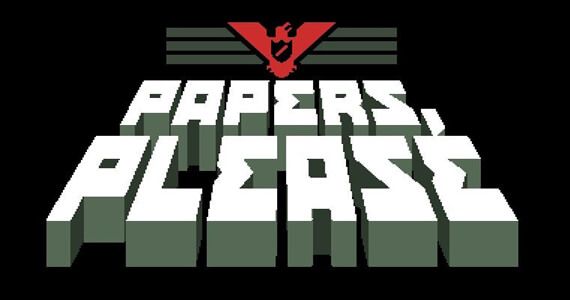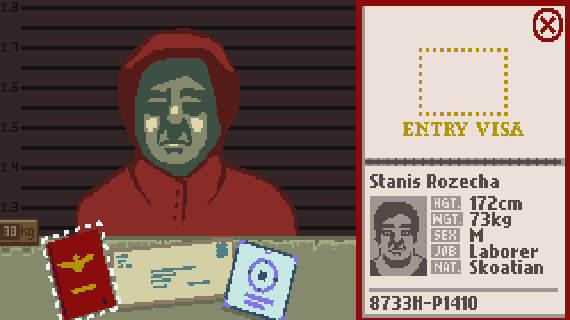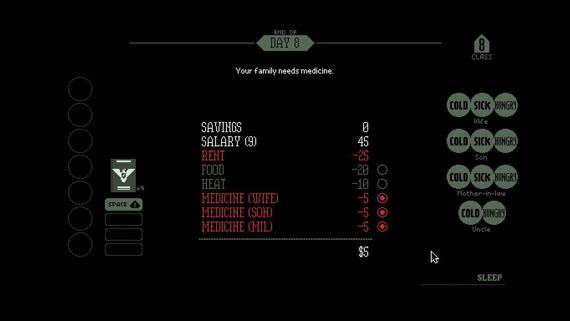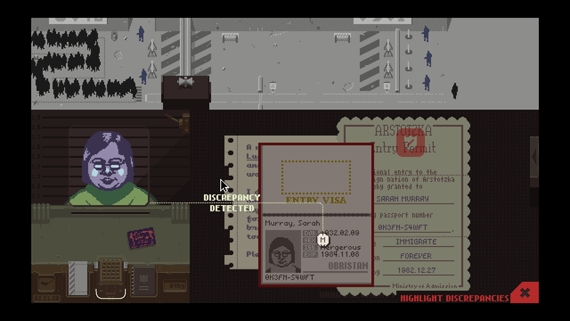If industry awards were handed out in categories like “Most Boring-Sounding Premise” or “Game Mechanic No One Asked For…Ever,” then independent developer Lucas Pope’s Papers, Please would score the clean sweep this year. Turning a virtual daily grind at a seemingly mundane occupation into a game people would actually want to play is no easy task, but it is, nonetheless, the one Pope decided to try and tackle.
Indeed, Papers, Please does offer more than its simple mechanics would imply, but is it enough to make it standout amongst the ever-growing and competitive indie market? Read on to find out.
There’s no reason to be coy about this one: Papers, Please is absolutely an astoundingly brilliant exercise in game design. With no flashy graphics behind it, a level of narrative restraint unseen in most titles (indie or AAA), and final outcomes so bleak that it blurs the lines of “fun in games,” Papers, Please is a game that must be experienced to be believed. It plays with numerous gaming conventions that players have been conditioned to respond to, and it does it in a way that creates nothing less than player tension, moral ambiguity and even a few reflections on the current state of national and world security. The game does so much with so little.
Like Limbo, Paper, Please is full of mechanics and stylistic choices that are only there to reinforce and communicate various aspects of the game, be they thematic or narrative. Everything works for the game, and nothing is superfluous. As hinted at before, to describe the basic gameplay here would almost certainly scare away any gamer not specifically seeking this title. The game starts with the glorious proclamation that the player has “won the labor lottery,” and in doing so the job of a border checkpoint clerk, in the fictitious country of Arstotzka. Arstotzka has recently ended a multi-year war with neighboring country Kolechia, and the player must check the documents of anyone crossing through the border town of Grestin.
That’s it. That’s the game. The player is tasked with checking and verifying documents and either stamping those documents with an “Accepted” or “Denied” label. The game is broken down into workdays. Each morning you are given a set of guidelines for who may be let in and money is given for each person you assist. Make a mistake by not double-checking a birthday or passport expiration date, and it’s possible to be docked pay.
At the end of the first day, however, it becomes clear that “winning” this job might not have been so glorious after all as the game unveils the large family the player must provide for on an extremely meager salary. Expenses like heat and food, on top of rent, all must be accounted for. If anyone gets sick, medicine is extra. Let any of these “luxuries” go and the status indicator next to each family member denotes whether they are cold, starving or extremely ill. Let them go for too long, and the player will find themselves without the “burden” of a living family rather quickly.
This simple set-up acts as the first foundational motivator that will affect every decision thereafter. Nothing like a family on the brink of starvation to light a fire beneath that virtual posterior. What better motivation than that to jump into the second day and start stamping passports two at a time, right? Not so fast.
While the simple answer of course seems to be to work faster, Papers, Please isn’t willing to make it that easy. Each morning the front page of the local newspaper displays the day’s headlines. The player is recounted stories of a terrorist bomber they may have let through, or how the black market trades are now booming due to the influx of immigrants. All of these occurrences cause the need for stricter admission guidelines, which means a process that takes longer, which in turn means deciding whether or not to do the job quickly or do the job well. And still, despite that being a choice many can relate to, it’s when the game puts the player in a position to make an impossible decision that the game really shines.
For example, when a young girl comes through the line and begs for you to not admit her new employer, in this case a potentially violent brothel owner, for fear of her safety, it seems like a favor that anyone would comply with. However, when the man’s papers all check out and not admitting him could mean the loss of the money essential for medicine that could save your dying son, the decision doesn’t become so clear cut. Or how about separating a husband and wife that are fleeing from the violence in another country all because the wife was missing one document? Will you let your family go without heat for another day due to being docked in pay for letting the wife slip by, or will you ignore her pleas for help and split the couple up because your apartment’s heat hasn’t been on in days? These are just a couple of the situations in which you are forced to decide what is most important to you and what you are willing to do for your family, safety, country and personal humanity. And of course, the aforementioned newspaper headlines are there each morning to show the impact of your decisions. Doing what you think is the right thing doesn’t always get to feel right, especially when the scope of your actions begins to reach far beyond just you and your family.
This is gut-wrenching immersion at the polar-opposite end of the spectrum when compared to something like the Uncharted series. While those games are all about sensory stimulation, visual, aural and tactile realism, Papers, Please employs one of the most under-utilized tools in gaming when it comes to building immersion: realistic consequences. No matter how many people Nathan Drake murders in the name of finding some golden trinket, he will always be the hero. Papers, Please, on the other hand, isn’t willing to give players the same narrative safety net, and it is painfully effective.
Visually the game takes a simplified approach that aesthetically conveys the feel of the game. In a word, it looks oppressive. Its simple and crude look, combined with a color palette filled with gray, help cement the player in the game’s daily grind, and don’t offer any sort of visual reprieve from the game’s bleak narrative outlook. The soundtrack utilizes the same philosophy. It’s march-like chiptune score cleverly only arises during non-gameplay portions of the game. When it’s time to work, it’s time to work, and there’s no whistling being done to help distract from the task at hand. Again, both aspects feature simple choices that add up to large strides in the overall vibe of the game.
If any criticisms must be levied, it’s that replaying the game’s story mode doesn’t really vary the proceedings up. Names get changed, but major events happen on the same days each time. So while the replay value is high so that all of the game’s possible endings can be seen, getting to see all of them once will require seeing some things much more than once.
Papers, Please is not a game for everyone. It’s not even a game we can guarantee you’ll have fun playing, in the traditional sense. Just like not every worthwhile film is fun to watch, Papers, Please isn’t always going to put a smile on your face. But the array of emotions the game succeeds in making you feel is well worth the experience. From questions of personal priorities to how quickly you’re willing to invade someone’s physical privacy, this game refuses to let up on the player. And after all is said and done, it may very well be a game that you are relieved to be done playing, but it will also be a game that you likely won’t stop thinking about long after turning it off.
___
Papers, Please is currently available for PC and Mac.




